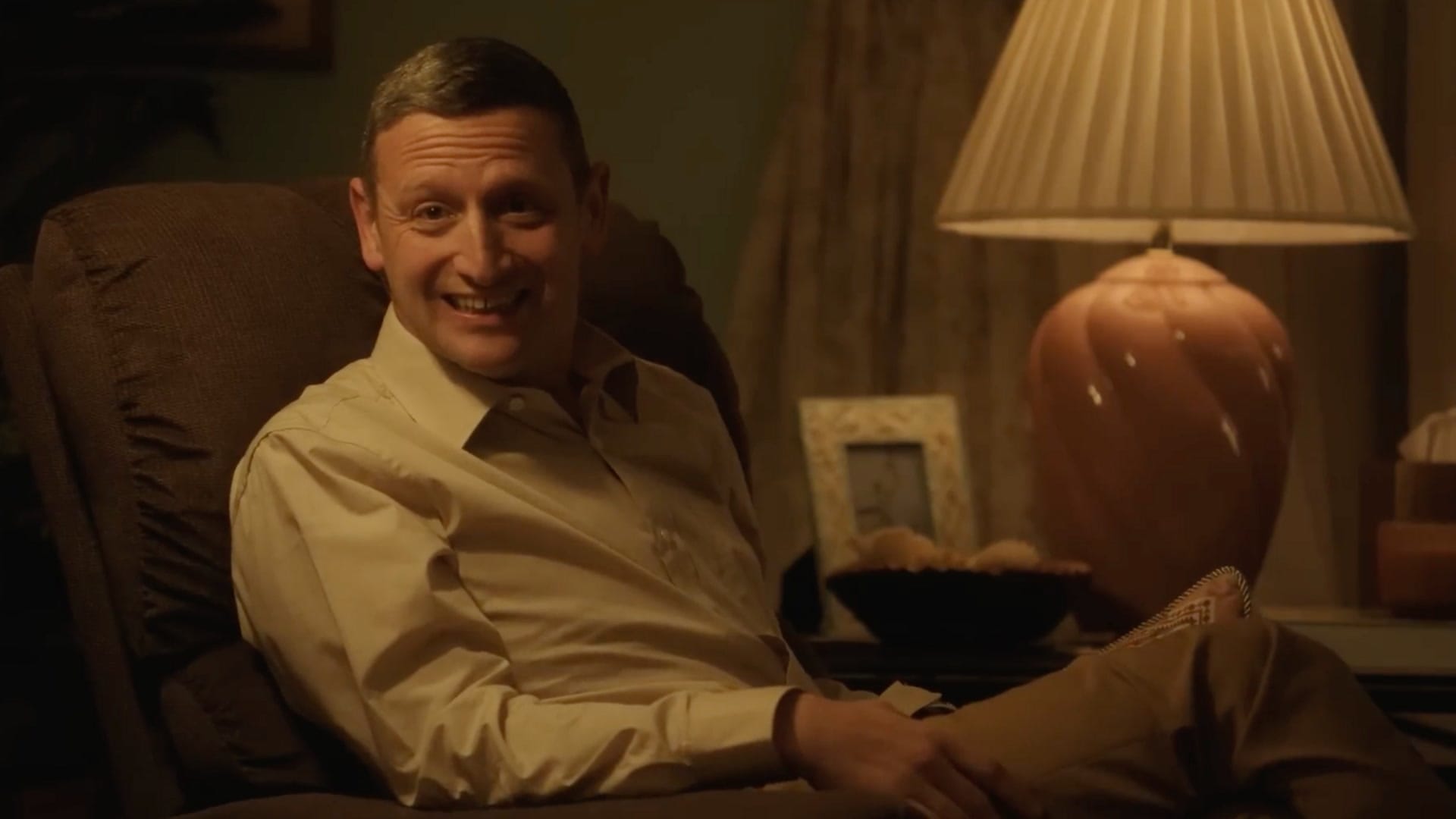See 'Friendship'
Boy you should know that.

Mild spoilers.
There is a theory, ingrained in the cultural firmament around the time of the original Jackass movies, that insists the subtext of most male friendships is latent homoeroticism—that most men wish they could fuck each other but simply can’t, and this is inherently funny.
Now fellas, I don’t agree with this–but the idea persists because our culture cannot grasp relationships that are non-transactional. We want to insist there’s something weird about cis male friendship. Masculinity across cultures has proven to be hostile to vulnerability, kindness, and curiosity, among many other things. But the idea that men simply cannot be vulnerable without lusting after one another is a dead-end.
My objection is based on my assertion that none of my friendships are inherently humorous. I know people, I share things with certain folks and I share things with certain other folks and so on and things are copacetic, angst-free, and not dripping with undue sexual lust. My friendships bring me closer to people, instead of alienating me from my true self or the real world.
An evolution of this theory is demonstrated in Overcompensating, a funny and periodically touching tv show from Benito Skinner that is a number of things: an impressionistic college-experience period piece that uses the post-Occupy, pre-COVID (2012-2019) era as a backdrop; an examination of being closeted; a retrospective on millennials failing to bridge the gap between the old world and the new one; an investigation into the erotic tension between straight men. Skinner, who is queer, documents as an outside observer: straight men talking to each other devolves into doglike barking, non-linguistic emission of sounds and gestures, increasingly obtuse and nonsensical descriptions of sex acts, with scenes shot as revival-style theatrics.
This is what the experience of a sports bar or dorm room feels like, and Skinner ascertains in their dynamics an avant-garde level of detachment from language and behavioral norms that codes as violence. This is funny, because most men are borderline nonverbal, especially socially, and most are capable of extreme depravity when you apply a fingernail’s worth of pressure at the skin. This is how we get Steve Carrell likening breasts to “bags of sand” or calling someone “kinda a pussy” (an insult hurled at Overcompensating's protagonist by an associate who doesn't know he's gay but senses he's different); language and intentions deteriorate fast between men who sometimes want to fit in but most of the time push each other away.

What’s most striking about Andrew DeYoung’s Friendship is how it is explicitly about the weird shit men get up to when they’re alone, but without a homoerotic subtext. There’s mystery and tension between men who do not share much about themselves as they get to know each other, but there’s always dread in sharing what you want about yourself to new parties.
The movie teases us with standard “men are freaks” tropes but leaves them more of a puzzle than a mission statement about desire. (Paul Rudd’s group of friends singing “My Boo” to each other both illustrates this theory while also subverting it by being so wildly out of left field.) Friendship takes us right to precipice of having us judge who we think is the real sicko, then wisely leaves us alone with our observations.
We’re certain Tim Robinson, married to a newly cancer-free Kate Mara, is the strange one: he doesn't get along with his wife or his son, he's made fun of at work for carrying a cup of coffee filled to the brim down a hallway, he looks and acts like Tim Robinson. We get 90% of the way there, especially after a violent outburst that outs him from Rudd's friend group. Yet when we glimpse behind the outer shell of Rudd’s personality—the contrast between his unglamorous day job as a weatherman and the threatening phantasmagoria of his gigs as a singer in a bar band points toward a foundational darkness, he owns a gold-plated gun, he's deathly afraid of having the world find out he wears a toupee—Friendship ponders who’s really the freak, or if maybe we're all freaks. Robinson’s outbursts seemingly ding him as the culpable one, but Friendship also lets us see the weirdness of men alone in community wherever they may be (at the workplace, in garages).

I go hot and cold on I Think You Should Leave, Robinson’s signature project, sometimes finding it funny and sometimes finding the jokes and their depiction so broad they border on anti-comedy. (It’s like if every Mr. Show sketch was “The Story of Everest.”) Robinson is one of a few people in the world whose face is hilarious, and he knows how to use it. He plays his character in Friendship as he would on the show: in any given moment of mundanity he will do or say something that suddenly makes you aware how empty most of our modern exchanges are. They mean nothing; we say nothing; we express nothing; we desire nothing; we thoughtlessly churn through our days. Especially pre-2020, “the new Marvel” is a substitute for culture, curiosity, and quality time all at once.
Pulling instead of pushing on a door becomes a Bunuelian descent into chaos and an untangling of banal niceties. Giving your wife a friendship initiation that leaves her missing for days is also a kind of descent, especially from an inept, ineloquent man who saw, craved, and got something he wanted (a friend, then intimacy) before attempting to transfer that onto someone who can’t fulfill those same roles. We’ve normalized calling your spouse your best friend. Treat your wife like your best friend, she will go missing in aqueducts.
After Robinson knocks Rudd unconscious he says something to the effect of “you let me be myself too soon.” It's nearly impossible to ever get to truly know anyone, ourselves included. How do you reconcile that while also being social animals who need each other? Descend into paranoia, distrust, and xenophobia? That is what the conservative right (and the manosphere etc etc) does, which has put us on the fast track to literal societal collapse.
The other option is blasé quirkiness, where you can choose to be who you want, but subservient to the idea that being a “chill guy” is undercut with fear of exposure—you will know I am not as chill as I seem, you will know I do not know myself and I do not know you and modernity is alienation from ourselves but not our basest instincts–and this causes us to behave in fucked up anti-social ways.

There is no solution to this, which is why the group chat is the most essential and humane invention of the 21st-century. I know you, but not too closely. You can reach me, but at my discretion. We can share our deepest desires, wildest takes, or most milquetoast platitudes, and it all registers the same. I would almost certainly prefer the option of kicking it in your garage. But at least I feel sane when I turn off my notifications at night, going to bed with a clear mind and comforted by the ambient hum of friendship running on my encrypted messaging app, safe from the NSA and Mark Zuckerberg and the indignity of face-to-face interactions. At the end of the movie, after their lives have spiraled out of control, Rudd coyly acknowledges the shared damage between them. Friendship suggests it’s best to suffer indignities together because the alternative is too bleak to comprehend.
What I'm reading: All Empires Must
Listening to: Born Again
Watching: The Rehearsal